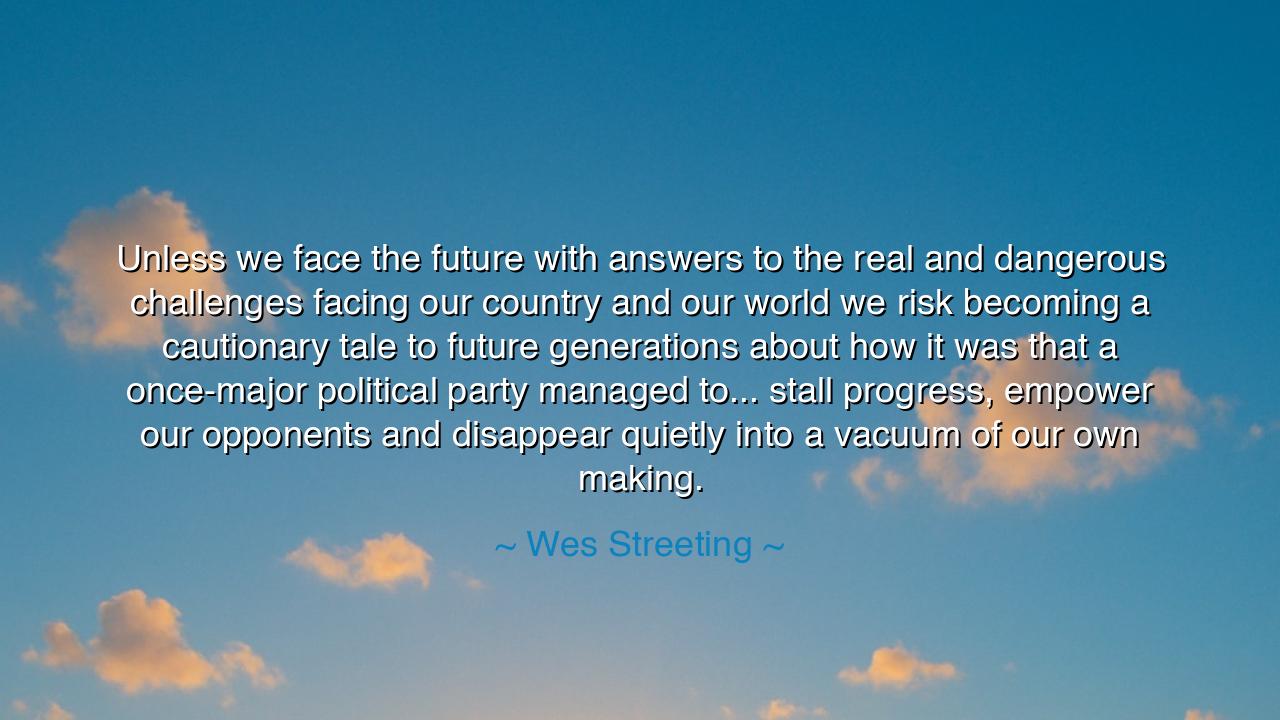
Unless we face the future with answers to the real and dangerous
Unless we face the future with answers to the real and dangerous challenges facing our country and our world we risk becoming a cautionary tale to future generations about how it was that a once-major political party managed to... stall progress, empower our opponents and disappear quietly into a vacuum of our own making.






"Unless we face the future with answers to the real and dangerous challenges facing our country and our world we risk becoming a cautionary tale to future generations about how it was that a once-major political party managed to... stall progress, empower our opponents and disappear quietly into a vacuum of our own making." These powerful words spoken by Wes Streeting carry a deep, urgent message about the consequences of inaction, especially in the face of the ever-evolving challenges of our world. Streeting speaks to the responsibility of leaders, and particularly political parties, to address the real and dangerous challenges that threaten the stability and prosperity of society. If those in power fail to act with courage and vision, they risk becoming footnotes in history, a cautionary tale of missed opportunities and squandered potential.
In the ancient world, the greatest leaders were those who could anticipate the future and take bold steps to address the crises of their time. The Greek philosopher Plato spoke of the importance of foresight in leadership, believing that rulers should not only govern with wisdom but also with a profound understanding of the long-term impact of their decisions. Plato’s idea of the philosopher-king was not merely a leader who acted in the present but one who understood that the health of the state depended on the ability to address future threats—whether they were external, like invasion, or internal, like corruption and division. To fail to act with foresight was to risk the decay of the state, much like Streeting warns of the collapse of political institutions in his quote.
History is filled with examples of nations and civilizations that, in their complacency, ignored the challenges before them, only to later collapse under the weight of their inaction. Consider the fall of the Roman Empire, which, at its height, was the dominant force in the ancient world. Yet, despite its military prowess and cultural achievements, Rome failed to address critical internal weaknesses—political corruption, economic instability, and social inequality. As these challenges grew, Rome’s leaders remained distracted by the splendor of their empire, failing to enact reforms that could have strengthened their civilization for future generations. Instead of adapting to the challenges of the age, they let their empire stagnate, eventually falling to invaders. Rome, like the political party Streeting describes, became a cautionary tale—one for future generations about how great powers can stall their own progress and fade away into history.
The rise and fall of political movements also offer lessons in the importance of addressing the challenges of the time. In the 20th century, the Weimar Republic in Germany serves as a powerful example. Born from the ashes of World War I, it was a time of great political upheaval, economic crisis, and social unrest. Yet the leaders of the Weimar Republic, instead of confronting these challenges head-on with bold and innovative solutions, became mired in inertia and political division. Their failure to respond to the economic devastation of the Great Depression, and their inability to build strong, unified leadership, paved the way for the rise of extremist forces, most notably the Nazi party. The Weimar Republic’s inability to act decisively became a tragic example of a nation that failed to face the future and ultimately succumbed to its own failure to address the real problems of its time.
Streeting’s warning is not just about politics; it speaks to a universal truth about leadership in any era. To face the future, we must first acknowledge the challenges that lie before us—climate change, economic inequality, political polarization, and many others. It is not enough to rest on past successes or to be content with temporary gains. Just as Plato implored rulers to understand the long-term implications of their actions, Streeting urges us to recognize that failing to address these challenges now will ensure our future generations will view us as the architects of decline. Leadership, whether in politics or in life, requires vision, the ability to see beyond the present moment, and the courage to act even when the path is difficult.
The lesson that Streeting’s quote imparts is one of urgent responsibility. Leaders, whether in government, business, or community, must confront the real challenges of their time. Avoiding these challenges, or simply reacting to them when they become crises, is not enough. True leadership is about taking initiative, creating solutions, and building structures that can withstand the test of time. In the face of adversity, a leader must not shrink back or wait for others to act. Instead, they must rise to the occasion and guide their people toward solutions that will sustain and strengthen the future.
For each of us, whether in our personal lives or in our communities, we must take this lesson to heart. Do not wait for others to act; instead, rise up, see the challenges ahead, and face them with courage and wisdom. The future will not simply arrive; it will be shaped by the choices we make today. Take action, speak out, and engage with the difficult questions that will define the future of our world. Our legacy will not be determined by the ease of our time, but by our response to the pressing challenges we now face. Let us not become a cautionary tale for the next generation, but a story of leadership, vision, and hope.






AAdministratorAdministrator
Welcome, honored guests. Please leave a comment, we will respond soon